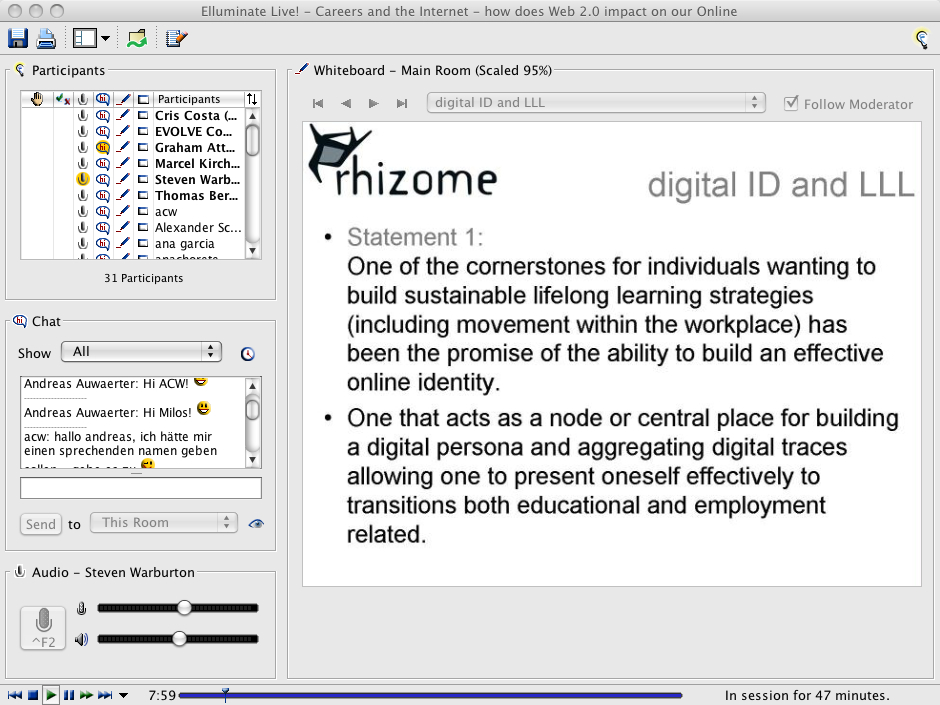It is the season of predictions for 2009. Here is mine – 2009 will be the year of Open Education. Seminars, workshops, lectures, courses – all available on line and for free. I am not sere I trust my star-gazing ability – or my ability to predict technology development trends for that matter – so we are doing our best to make sure it comes true by organising a series of events ourselves.
Over the next few days I will be posting details of a whole series of different events. First up, here is the spring Open Seminar series being organised by the JISC Evolve network in collaboration with the German Educamp Network who are staging a series of conferences around Web2.0 social software and elearning. is organising the third EduCamp in Germany.
Emerging Sounds of the Bazaar Live
26 January 1900 CET, 1800 UK time – Dragons Den special – Learning and Multi user Virtual Environments
23 February 1900 CET, 1800 UK time – The reality of communities
March 2009 – time and date ot be announced – LIVE broadcast from JISC Emerge conference.
You can listen live to all the programmes by going to http://tinyurl.com/6df6ar in your web browser. This will open the live stream in your MP3 player of choice.
Emerging Mondays Seminars
The open online seminars will take place on the Elluminate platform. We will announce the address for the events shortly, together with the final line line up of presenters. Each seminar will feature tow short introductions with most time being given over to discussion.
PLEs and E-Portfolios – is this the future of education?
January, 19th 2009, 1900 CET, 1800 UK time. Click here for access to Elluminate.
Speakers: Graham Attwell, Pontydysgu
Moderators: Thomas Bernhardt and Marcel Kirchner
- What does a PLE look like?
- What is PLE? A technical concept or a pedagogic method?
- How can we use e-Portfolios and PLEs in practice?What is the difference between a PLE and an E-Portfolio?
- Is the PLE the future of education?
Careers and the Internet – how does Web 2.0 impact on our Online Reputation and Identity
February, 16th 2009 – 1900 CET, 1800 UK time. Click here for access to Elluminate.
Speakers: Steven Warburton, Kings College, Eduserve funded Rhizomes project
Moderators: Cristina Costa and Marcel Kirchner
- How can we use E-Portfolios and other tools for applying for jobs and building identities
- The risks and opportunities in developing a web identity
- Privacy 2.0
Enterprise 2.0 – the potential of Social Software for learning in enterprises
March, 16th 2009 – 1900 CET, 1800 UK time. Click here for access to Elluminate.
Speakers: Timothy Hall, University of Limerick, Ireland
Moderators: Cristina Costa and Steffen Büffel
- How is social software being used for learning in enterprises
- Can social software support communities of practice
- How can social software support informal learning
Edupunk – Free the educational system
April, 6th 2009 1900 CET, 1800 UK time
Speakers: Dr. Martin Ebner and Steven Wheeler, University of Plymouth
Moderators: Thomas Bernhardt, Marcel Kirchner and Cristina Costa
- Edupunk – hype or reality
- Does e-teaching need a pedagogical apprenticeship?
- Why and how far students should be involved in the developing process of courses?
ThoughtFest 09
5-6 March, Salford, Manchester, UK
Thought Fest is a two-day event being organized by Pontydysgu with the support of the JISC Evolve network and
the European Mature-IP project.
The event will bring together researchers in Technology Enhanced Learning in an open forum to debate the current issues surrounding educational technologies and discuss how and where research impacts on practice and where practice drives research.
Whilst there will be keynotes by Graham Attwell and Steven Warburton, Thought Fest is a user driven workshop and we welcome ideas for sessions, demontsrations activities. Accomodation and food for free – you juts have to pay for your travel.
More details here or sign up on this page.
Educamp
April 17th – 19th
Venue: Ilmenau, Thuringia, Germnay
What is the EduCamp all about?
The EduCamp-Network (http://educamp.mixxt.de/) is organising the third EduCamp in Germany. This will also be the first international EduCamp. The event will take place from the 17th to the 19th of April, 2009 in Ilmenau, Thuringia. Details of previous EduCamps can be found at http://educamp.mixxt.de.
There will be some initial structure for the programme, but after the panel discussion on Friday, the EduCamp will be organized as a barcamp. Sessions and workshops will be organised by participants at the beginning of the event. On Sunday the topic under discussion is “EduOpenSpace” (OpenSpace?). Participants will form clusters to discuss some of the related topics.
Topics
The issue of how we can use social software, such as weblogs, podcasts, wikis, micro-blogging, VoIP in education in schools, universities and companies is a subject attracting much interest. Developing connections to other people and joining learning networks is central to the Information society. Mulitple knowledge resources all access to the exchange of experiences and the construction of knowledge.
The last EduCamps meeting discussed ‘Teaching and Learning 2.0’. This meeting will continue those discussions.
EduCamp is an open event and everyone interested in welcome to attend. It will take place at the Humboldtbau at the Technical University of Ilmenau.
The main topics for the EduCamp are Corporate Learning 2.0 and e-learning in schools or universities. Other topics include the use of E-Portfolios, Digital games and virtual worlds in education. In line with the idea of barcamp, everyone is invited to propose their own topics for discussion.

